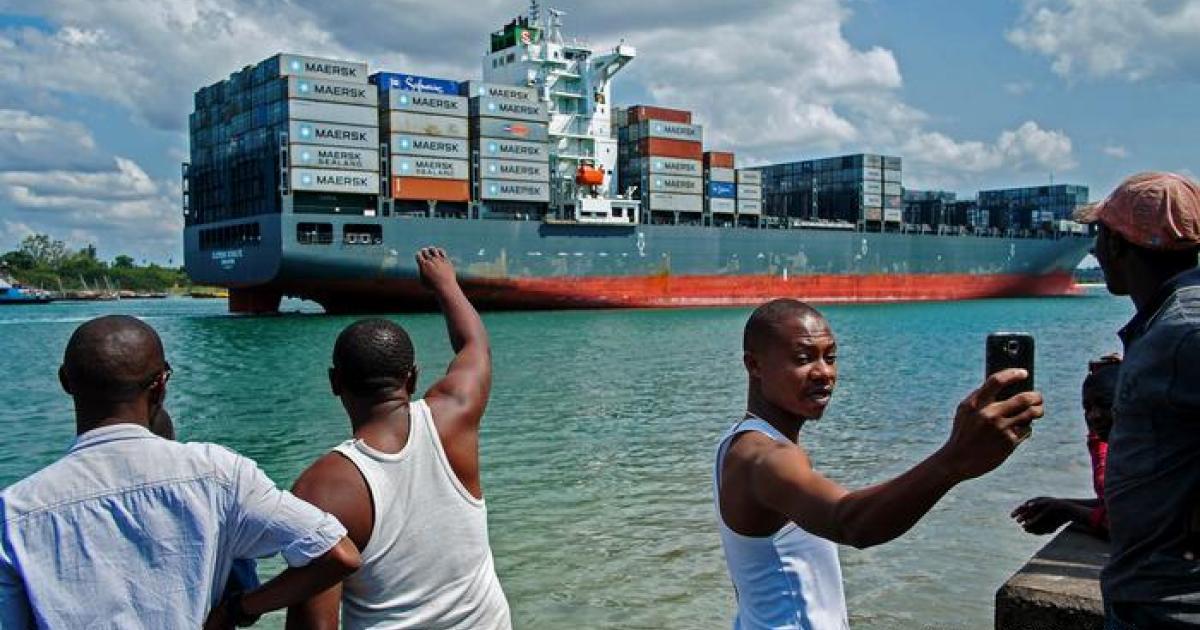Africa-Press – Rwanda. Source: Isaac Mugabi, DW ( Deutsche Welle)
For fear of scrutiny, many port authorities keep their losses under tight guard and only release profit figures, which is a small fraction of the losses accrued. Moreover, in many cases, the websites of port authorities have not been updated with information on losses in real-time.
For instance, customs officials at Lagos Port, one of Africa’s busiest ports, said the port generated revenue of $1.2 billion (€1,23 billion) in the first quarter of 2022.
But a joint report by the Maritime Anti-Corruption Network (MACN), a global sea trade and shipping group, and the Lagos Chamber of Commerce and Industry said that Nigeria loses $7 billion annually to corruption and inefficiency, according to Nigeria’s daily The Vanguard and Business Week.
The profit and loss statements that summarize the revenues, costs and expenses accrued are hardly shared in the public domain.
Separately, in the 2020/2021 report, MACN identified Nigeria as one of the most challenging countries to do business. The organization said corrupt demands posed a significant risk to member companies that faced extortion, harassment, and threats of violence.
Moreover, regulations and procedures in ports were lacking in detail and consistency, giving authorities broad discretionary powers, the report said.
However, MACN said a helpdesk and an anonymous reporting system for distressed vessels had helped curb corruption demands. Since the helpdesk launch, over 460 pre-notification arrivals have been processed through the system.
The plight of clearing agents
Samuel Adebisi, a clearing agent at Lagos Port, told DW that it is challenging to clear goods without paying a bribe to the customs officials.
“Officials mount several illegal toll points where they extort money before any truck can move in or out of the port,” he said. In addition, the roads that enter the port are another nightmare for the clearing agents, and trucks are known to queue for weeks on the bad road that leads to the port.
“They [customs officials] keep collecting charges without even fixing the road at the port to the extent that containers sometimes fall off trucks,” Adebisi added. Apart from extorting money from the agents, there are frequent cases of missing goods or parts of imported motor vehicles.
Mayowa Adeola, a resident of Lagos, told DW that there’s hardly anyone who imports anything into Nigeria without items being stolen.
“I have an Audi Q7 (2010) model at the port, whose bumper and grill have been stolen, these things happen very often, and I think it is because no one presses charges against the customs officials,” Adeola said.
Due to the rampant extortion, truckers often protest outside the port, and there have been frequent calls for the government to intervene so that business at the port can improve. On a previous visit to Lagos Port, Nigeria’s Vice President Yemi Osinbajo promised to improve the situation.
“This is a crucial economic axis for Nigeria because most of our imports and exports come through here. Therefore, we cannot afford to have the state of affairs as it is,” Osinbajo said.
“I have already drawn up some sort of a road map and a checklist of the various things we need to do in the next couple of weeks, and we are committed to making sure that it works,” Osinbajo emphasized.
The situation at the Lagos Port paints a larger picture of the systemic problems in Nigeria – where politicians make promises but fail to fulfill them.
The Djibouti Port is used to channel much-needed aid to conflict zones like Ethiopia’s Tigray region
The Liberian dilemma
At the Monrovia Free Port in Liberia, importers face the same challenges as their Nigerian counterparts. The importers told DW that among the challenges they face is a backlog of containers and shipments, and clearing their goods has become a nightmare.
Dominic Nimely, an importer at the Free Port, said they are soon running out of business because of high costs and the long waiting time to clear goods.
“Freeport has lots of disadvantages in doing business in Liberia. One has to do with the various shipping lines. We used to pay $75 to collect our delivery orders. After Madam Sirleaf’s first term, it went up to $250,” Nimely told DW.
“There is a lot of bureaucracy, and it’s like we are doing business for the government and banks. In addition, APM Terminal doesn’t take Liberian Dollars, and there is nothing being done.”
APM is an acronym for (Annam Peter Moller), a Danish shipping company that signed a 25-year agreement during former President Ellen John Sirleaf’s tenure to manage Liberia’s Free Port.
Importers accuse APM of conspiring with other cargo handling companies to delay the clearance of goods to charge higher tariffs deliberately.
“APM and three other companies have a cartel to delay paperwork so that you pay storage money. We have filed complaints to the commerce ministry and to the Liberia Revenue Authority (LRA), but nobody seems to care,” Nimely said.
But for its part, APM issued a statement saying that it has embarked on improving customer service using technologies. That way, the role middlemen play at FreePort will be minimized.
Robert Feahn, who has spent seventeen years working as a customs broker and car importer at the Free Port, said he is soon leaving the business because of high tariffs imposed on goods passing through the port.
“Can you imagine that if you import three cars into this country, you could be charged between $7,000-$8,000 per car?”
“If I happen to get those cars out of the port, how am I going to sell them to get my money back? It’s simply trying to take us out of business. Foreigners are taking over the business, and we, the typical Liberians, are going out of business,” Feahn told DW.
But Saa Saamoi, the Customs Commissioner at the LRA, downplayed the accusations and instead blamed delays on importers themselves.
“Some of the reasons people get delayed at the port is not because of the officials, but because they are trying to find ways to cheat the systems in place,” Saamoi told DW. “Additionally, some importers don’t follow the right procedures when clearing goods and are advised to start afresh. That contributes to the delays.”
Saamoi said his institution is committed to fighting bribery by red-flagging rogue brokers and vowed to revoke their licenses.
“Right now, we are preparing to publish “red-flagging brokers” or whichever broker or customs officer is involved with customs-related frauds on our website.”
Saamoi said there will be zero tolerance for corrupt customs officers and added that “the LRA has dismissed more officers than any other public institutions in this county – and it’s all related to fraud and integrity issues, nothing else.”
The United States recently sanctioned three senior Liberian government officials, including the head of Liberia’s National Port Authority, Bill Twehway. Under pressure from the United States to tackle rampant corruption – Liberia’s President George Weah immediately sacked the trio pending further investigations into their dealings.
Ghana’s push for better services
At Ghana’s busiest ports of Tema and Takoradi, importers and shipping companies are at the forefront to ensure customs officials don’t ask for bribes to let goods go through and clear cargo in time.
The two ports receive approximately 1,650 vessels yearly, including tankers, cargo, and cruise ships. Despite recent improvements in infrastructure at the ports, Edward Akrong, the president of the Ghana Institute of Freight Forwarders, said there are still bureaucratic tendencies, especially in processing the necessary documents to clear goods.
“If I make a declaration today and pay the duties, that means that I should walk out later in the day with my goods, but that is not always the case,” Akrong said. He added that depending on the kind of goods one brings into the country. The law requires that I obtain “all the necessary permits from the standards authorities like the FDA [Food and drugs authority] or the EPA [Environmental Protection Agency]. That is where the issues are because it comes with costs and time.”
Ghana’s ports contribute significant revenue to government coffers, and 70% of the country’s business is conducted at ports. However, despite the high volumes of goods handled at the ports, high tariffs frustrate business growth.
Sampson Asaki Awingobet, the Executive Secretary to the Importers and Exporters Association of Ghana, told DW that his group is one of the biggest clients of the ports. Still, the government needs to revise the high charges imposed on importers and exporters.
A limping economy and high tariffs
And with Ghana’s worsening economic situation resulting in the loss of value of its local currency, the cedi, importers, and exporters must pay more.
The charges keep fluctuating in case of delays in paying on time. “For instance, if someone’s import duties are 78,000 Ghana cedis ($7,720, €7,771) at the start of the week and they can’t pay on time, the following day they end up paying an additional 25,000 cedis because the rates have moved from 7.2 to 9.5,” Awingobet told DW.
In many instances, clients can’t clear their goods from the ports in time, and these inefficiencies have resulted in corrupt activities among some staff. Akrong said processing challenges could undermine Ghana’s quest to become a major trading hub for neighboring countries. He called for reforms to make Ghana’s ports attractive for doing business.
“With the charges, I think they are superfluous, and seriously, they need to look into it. So, we need to consider the fees to make our ports business-friendly. Then, the high cost wouldn’t be a deterrent to the usage of our ports.
Asaki from the importers and exporters association also recommends that the government must not burden the ports with raking in excessive revenue.
“I think the government should not use taxes to prevent importers from using our ports. I strongly believe that it should be easier and compliant so that they can comply. If you make it so that people want to evade the taxes, then you end up not getting the desired results,” Asaki concluded.
China helped expand East Africa’s largest port, Mombasa Port, an important logistic hub in the region
The East Coast woes
The Mombasa Port in Kenya, under the Kenya Ports Authority (KPA), serves as the gateway to countries in the East African region and some in the Horn of Africa, like Ethiopia and Somalia.
However, despite undergoing modernization and expansion in the last ten years – the Mombasa Port has been dogged by corruption and poor management. Traders complain of syndicated corruption from the top administration to the lower officials.
Charles Nganga, an importer of used vehicles, told DW that corrupt dealings at KPA have grossly affected business. Nganga said port officials give traders a few days to clear their goods.
“Once your shipment arrives at the port, you are given only four days clear it. Beyond the four days, you will be charged $100 per day, which will be added to the total amount of import duties,” Nganga said.
In addition, Gilbert Langat, the Chief Executive Officer of the Kenya Shippers Council, says that corruption at KPA also involves other players within the private sector who import counterfeit products.
“Corruption is not about the port officials or the KRA(Kenya Revenue Authority) officials. Corruption is two-way, and there must be two players for it to happen. As shippers and owners of the cargo, what is our role? “We are the ones that order for this cargo; why are we bringing in counterfeits and substandard goods?”
In an interview with DW, Sandra Sequeira from the Department of International Development at the London School of Economics (LSE) justified Langat’s claims and said there are two types of common corruption forms at seaport; Collusive and coercive corruption.
During her research, investigating and tackling corruption in African ports, Sequeira says, bribes at Africa’s seaport took two forms. “Collusive corruption where both parties benefited from an illicit deal, such as paying to evade tax, and coercive bribery or extortion, which only benefitted the corrupt official.”
Sequeira added that “It is challenging to stop collusive corruption because firms pay customs officials to have their goods cleared quickly or even jump the queue,”
South Africa’s power outages
In South Africa, ports are hampering economic growth for various reasons. For instance, domestic load-shedding and flooding in KwaZulu-Natal caused exports at the Port of Durban to fall by a third during April and May compared with the same period last year.
According to a World Bank Container Port Performance Index (CPPI) for 2021, South African ports are beset with operational inefficiencies. For example, at the start of this year, cargo ships entering Cape Town had to wait up to two weeks to berth before customs and offloading could commence.
The index, which rates the performance of ports worldwide, showed Durban, Cape Town, and Ngqura were in the bottom ten ports out of the 370 ports in the world. The CPPI used two approaches to grade port performances – Administrative and Statistical.
While the former was the aggregate of the general performance of the port, the latter involved factors such as the availability and quality of the infrastructure, the layout of the port, the expertise of the employees, and the berth.
Importers always attribute the delay in clearing their goods to unscrupulous officials at the various seaports. However, there are other factors as well. For example, ships may spend additional time in a port after the departure from a berth, and they may dwell within a port’s limits for reasons that include bunkering, repairs, or simply waiting in safe areas if unable to berth on earliest arrival at the next port.
Except for bunkering not being performed simultaneously with cargo operations, these causes of additional port time are not necessarily reflective of the efficiency or poor performance of the port, according to the CPPI.
LSE’s Sequeira said that corruption can have far-reaching effects on the economy and even affect the effectiveness or success of trade policy in Southern Africa.
“I found evidence that trade volumes did not go up as expected even when a country reduced tariff levels on several products. And my research documented that one of the key reasons might have been that firms were not paying tariffs because of corruption.”
“So when they change tariffs through these trade liberalization schemes, it had a minimal impact on firms’ ability to import and export more. So this has big implications for how we think about the effects of all these trade deals and trade liberalization schemes in the developing world,” Sequeira added.
According to the researcher, the situation at Maputo Port in Mozambique changed after she presented her findings to government officials. “The significant corruption that I found in the port of Maputo, accelerated a movement towards having online interactions between firm representatives and port officials. So what this did was to cut back on face-to-face interactions and make it harder for these two players to engage in bribery deals,” Sequeira told DW.
Sequeira’s research showed that in the most extreme case, a firm would be willing to pay three times as much as the bribe to travel ‘the long way round’ to use the non-corrupt port in Durban. “These firms were willing to pay a premium to avoid bribe payments’ uncertainty.
As well as a loss of revenue for the port, this loss of trade also meant that Mozambique missed out on the broader benefits that come from imported goods, such as technology, and their potential to help encourage economic growth and development.”
Firms that experienced collusive forms of bribery were more likely to use the corrupt port because it reduced their costs, but this corruption was associated with the equivalent of a five percentage point loss of tariff revenues for the government.
However, at the moment, firms operating from the Port of Maputo now have less incentive in Mozambique to pay a bribe to try to evade a tariff, as tariffs are much lower than before.
“The evidence that we have is that the bribe paid is relatively small and a gain for the firm. For example, if you want to jump the queue or be the first in line to enter the port. So while this can increase costs for the firm, it’s mostly a transfer from the private sector [firm] to a public official. So there isn’t much of a revenue loss for the government in these instances,” Sequeira emphasized.
There is great potential for many ports across Africa if digital systems are introduced and not tampered with. “Ports Authorities should think of fighting corruption as a kind of moving the goalposts and should always be kept on toes.”
For More News And Analysis About Rwanda Follow Africa-Press






